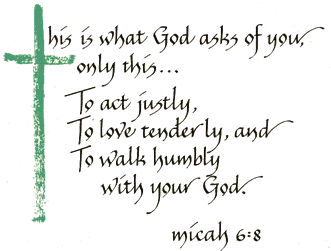catholicPittsburgh.org is the place for information, news, commentary, reflections and community building among the people of God who are renewing the Catholic Church in Western Pennsylvania.
More about us
Welcome ...
Partnering Groups
The following organizations are partners with catholicPittsburgh.org:
Reflections
From Inside the Locked Room

Reflections on Pentecost Sunday
By Carolyn A. Fronapel
The readings for this Sunday:
In the shadow of September 11, ours has increasingly become a time of clashing certainties. Everywhere the boundaries harden; everywhere the political and religious fundamentalisms I used to dismiss as marginal are branding the world with their sign and their sword. In church and state, science and medicine and art, this is more and more a time of absolutes.
Perhaps I am not alone in finding myself behind locked doors. Like the disciples in the Gospel passage appointed for this Pentecost weekend, I am huddling with friends who are as stunned as I at what has happened to the world and our shared hope. We are mourning the vision that had made all things seem possible, that had given us juice for the longer journey. We are struggling to find perspective enough to believe that the Spirit of God might still be moving over the chaos which is this moment in history.
- By JoeMertz at May 12 2005 - 10:13pm
- Reflections
- 2 comments
- Read more
Together with some women
Reflections on the Seventh Sunday of Easter
By Rebecca Mertz
The readings for this Sunday:
This Sunday marks my tenth Mother’s Day. As I look back at ten years of mothering, one of the sharpest memories I have is the incredibly scary and humbling feeling that came with recognizing that the tiny newborn nestled in my arms thought of me, the source of food, as his entire universe.
Giving birth and nursing a child are probably the closest earthly equivalent to experiencing God’s creative powers. When meeting other mothers, women will recount their labor stories the way war veterans discuss battles. For most mothers, the experience of giving birth remains the preeminent physical challenge of their lives. And coupled with the physical challenge is a mental one. The placid image of a nursing Madonna doesn’t depict bleeding nipples, colicky infants, exhaustion and worry. The “yes” that Mary said to God’s messenger is profound, but I’m far more moved by the personal knowledge of the “yes” she had to say every day of her son’s brief life.
In this week’s first reading we are told of the confusing time after Jesus’ resurrection when the disciples returned to Jerusalem and retreated to praying in the upper room. The disciples are carefully listed by name, but there at the end we get confirmation in the phrase “some women,” that there were females in attendance along with Jesus’ mother, Mary.
- By JoeMertz at May 6 2005 - 9:30pm
- Reflections
- 3 comments
- Read more
Reading the signs of the times
Reflections on the Sixth Sunday of Easter
By Michael Drohan
The readings for this Sunday:
The readings at Mass this Sunday all speak of the Holy Spirit in one way or another. In the Gospel passage, Jesus tells us he will send us an ‘Advocate' when he goes, the “Spirit of truth” to guide us. In the Acts reading, John and Peter go to Samaria to lay hands on the believers that they might receive the Holy Spirit. In the early Church, in addition to being baptized, it was deemed necessary to receive the Holy Spirit.
The Second Vatican Council in its document Gaudium et Spes on the Church in the Modern World speaks of the importance of being able to read the “signs of the times.” This is one of the most important gifts of the Spirit for us in the world today. Essentially it means that we attempt to dissect the forces at work in the world today and in ourselves, discerning where the spirit of good and evil are at work and aligning ourselves with the former.
- By JoeMertz at Apr 28 2005 - 10:54pm
- Reflections
- Read more
Even when it is Living stones and the call to justice
Reflections on the Fifth Sunday of Easter
By Fr. G. Dorsey
The readings for this Sunday:
“Beloved, let yourselves be built into a spiritual house to be a holy priesthood to offer spiritual sacrifices acceptable to God through Christ Jesus.”
The scriptures of this week continue the challenge to the first century newly baptized to live in a markedly distinct fashion from their former patterns of life. So, too, the call is for us to develop patterns of growth so that we are built into a living edifice truly acceptable as followers of Christ. The Gospel calls us to respond practically in the decisions of everyday conduct so that it fits with this new life we are to live. There is the obvious challenge to individual decision making as we relate to each person we meet. More than ever we find it a real challenge in a very complex world to make decisions that reflect the new life of grace we are trying to live. Acting rightly out of such decisions could well be termed “spiritual sacrifices”; would render us “ acceptable to God.”
- By JoeMertz at Apr 20 2005 - 5:07pm
- Reflections
- 1 comment
- Read more
Listen for the Shepherd’s voice
Reflections on the Fourth Sunday of Easter
By David Moczulski, OFM
The readings for this Sunday:
We continue on our Easter pilgrimage this week with the Sunday readings on “The Good Shepherd.” This image has been a constant presence in both church art and literature through out the ages. God walks among the people and God cares for the people. We celebrate this year the memory of two very good shepherds in the church. This year marks the 25th anniversary of the martyrdom of Archbishop Oscar Romero (March 24). I was reading this week an account of the day of his death. As he presided at the Eucharist the responsorial psalm of the day was Psalm 23, David, the shepherd king, proclaims the God who is providing rest, nourishment, renewal for the flock. How appropriate that the last psalm Archbishop Romero prayed was this psalm of the good shepherd.
- By JoeMertz at Apr 13 2005 - 5:26pm
- Reflections
- 1 comment
- Read more
Is there room for a third?
Reflections on the Third Sunday of Easter
By Donna Marie Oster
The readings for
this Sunday:
Alleluia! He is Risen! After his resurrection, Jesus appeared to the women, his apostles, and today to a road weary married couple. Today’s gospel is dedicated to all couples who have ever traveled or vacationed together. Yes, I do believe the two disciples on the road to Emmaus were husband and wife. One disciple is mentioned by name in Luke 24:18 -- Clopas. In John’s gospel, Mary the wife of Clopas was at the foot of the cross. (John 19:25) Women didn’t travel alone, so I’m sure Mary the wife of Clopas (from the foot of the cross) was going home to Emmaus with her husband Clopas. They were traveling together.
- By JoeMertz at Apr 6 2005 - 11:54pm
- Reflections
- 3 comments
- Read more
Room
Reflections on the Second Sunday of Easter
By Carolyn A. Fronapel
The readings for
this Sunday:
When we think about the coming of the Spirit, we usually remember the dramatic events recounted in Acts 2:1-11. Our imagination is captured by the rushing wind and the tongues of fire, the miraculous communication of the good news in myriad languages and bold speech bursting from people who earlier had been frozen with fear. In the Gospel of John, however, the coming of the Spirit is imagined much differently. In the Passion narrative of Good Friday, Jesus yields the Spirit with his last breath. In the passage we read this Sunday, he breathes it anew, this time onto the gathered disciples. Here there are no crowds, for the dangerous public is locked out of the place where they are gathered. No bold speech is uttered. They see no tongues of flame – only the wounded but risen Jesus who wishes them peace and sends them to forgive and set free.
- By JoeMertz at Apr 1 2005 - 12:16am
- Reflections
- Read more
Stepping stones or stumbling blocks
Reflections on Easter Sunday
By Carole Brennan
The readings for
this Sunday:
There is no way to have a resurrection without a Good Friday. The Tao states that "all can see beauty only because there is ugly. All can know good only because there is evil. Difficult and easy complement each other." The Tao also states: "Yield and Overcome." The ugly, the evil, the difficult, the yielding are the Good Fridays of our lives. The beauty, the good, the easy, the overcoming are the resurrections of our lives. They are Easter mornings. They are ways of living so that each day is a resurrection day.
- By JoeMertz at Mar 25 2005 - 11:42pm
- Reflections
- Read more
Micah 6:8

©1996 Cards by Anne
Used with permission